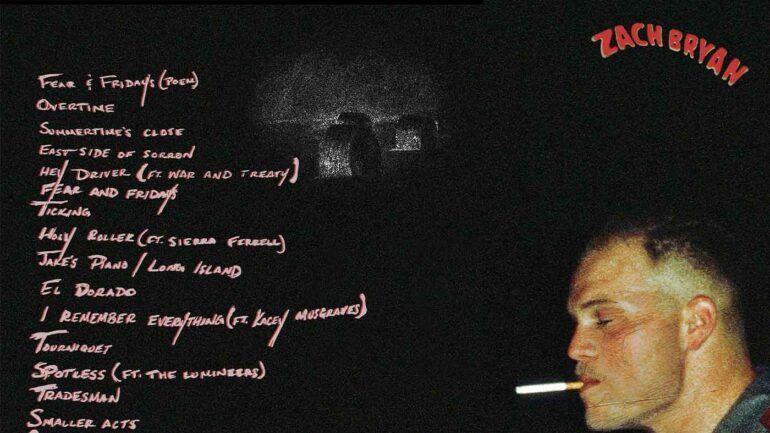“I’ve got no grand explanation for these songs,” Zach Bryan told fans in an Instagram post detailing the context behind his self-titled album. “Zach Bryan” comes after months of eager anticipation from fans, a 16-track album that dominated the charts mere moments after its release.
Bryan described his album flawlessly: “Some of it’s loud, some of it’s quiet, but it’s all me at twenty-seven.” His songs and poems somehow manage to capture the very essence of who Bryan is as an artist, namely worn around the edges, humble yet hungry. He is optimistic about his future without forgetting his past — a truth that is reflected in his songs. Bryan does not shy away from heavier feelings, as the album has an air of melancholy and nostalgia. His songs tell a tale of love and loss, but also burgeoning confidence.
Track one is a poem called “Fear and Fridays,” one I believe sets the tone of the album with its blunt scrutiny of the music industry. Bryan recounts beautiful things he has done in his life, such as “awoken on mountain tops” and “walked countless coastlines,” all of which is to say that he doesn’t “need a music machine telling [him] what a good story is.” This verse is so important because Bryan is finding his own sound for himself, telling his stories without the influence of someone else telling him what will sell or not. I think it’s an extremely powerful statement as he tells his fans that his stories, told through song, are authentically his own.
Bryan continues this message through tracks such as “Summertime’s Close,” where he sings, “I lost faith in the world a long time ago.” Here, however, Bryan seems to be finding his own faith, on his own terms. No one is telling him which way to look or how to decide what to write and release. In fact, I think it’s clear to see how personal these songs are to Bryan. “Hey Driver (ft. The War and Treaty)” includes the lyrics, “All the love I’ve had worth givin’ was all spent on my songs.”
One of my favorite songs on the album has to be “Spotless (ft. The Lumineers).” Besides the fact that The Lumineers add something magical to any music they create, it’s important to note that The Lumineers are one of Bryan’s favorite artists. Their collaboration only adds to the belief that Bryan has grown closer to finding his true sound. The Lumineers and Bryan alternate their repetition of one important line, one I argue is a persistent theme throughout the album: “People die a thousand times to get to who they are.”
That verse is one you can’t help but chew over. It takes a moment to swallow because it is an acknowledgment of heavier pasts that won’t be accepted quite so easily. Bryan makes this clear — that struggle to accept the worst parts of yourself so you can see the best. To literally “die a thousand times” to finally see who you are meant to be is a struggle of a lifetime, one that Bryan writes so poignantly of.
Furthermore, besides my belief that “Oklahoma Son” is a brilliant closer, I also think it’s a song that further forms the message Bryan tries to spread. Track 16 is one of those songs you remember because everyone has a bit of their history that isn’t so light. This album slowly builds from wary confidence to a greater acceptance of that darker past.
There is no delusion in Bryan’s mind that he is this big star, one untouchable by life. What separates him from so many other artists is the fact that he realizes the gravity of the importance of his love for music. As a result, Bryan grows increasingly adamant that nothing destroys his authenticity — a music machine, fans, etc. He takes the parts of himself that aren’t so pretty and reflects them in his writing, all for the chance someone can relate and feel less alone. “You can fight and fiend and sell your guns,” Bryan sang to close out his album, “But you’ll always be the Oklahoman son.”
On another note, something I find so fascinating about Bryan’s newest release is how he manages to capture relative feelings of melancholy love and loss so eloquently as they relate to his growing up and experiencing life. There is not only the growth he does by himself but also growth related to the people in his life that he’s loved and lost.
“You’d feel her in a room if you was blind. There ain’t a thing a man can do,” Bryan wrote in “Smaller Acts.” To me, this song is written longingly, telling a tale of someone who loved Bryan at his worst, waiting for him to make the changes he needed to. The pining I feel in the song is one I think parallels Bryan’s message of self-growth and authenticity. Relatedly, “El Dorado” tells the story of a friend whom Bryan has no contact with, and one Bryan cannot determine if still cares. Still, he sang to this friend, “A man I wish was still by my side / You’re in every last memory alive.”
Overall, Bryan’s memories and experiences make him who he is. Through tough times and people who left clear and lasting impacts, Bryan managed to write and release an album that leaves no question about what has shaped him, as an artist and as a man. Each song had a distinct but related sound, a cohesiveness that made listening to each song a truly wonderful experience.





































































































































































































